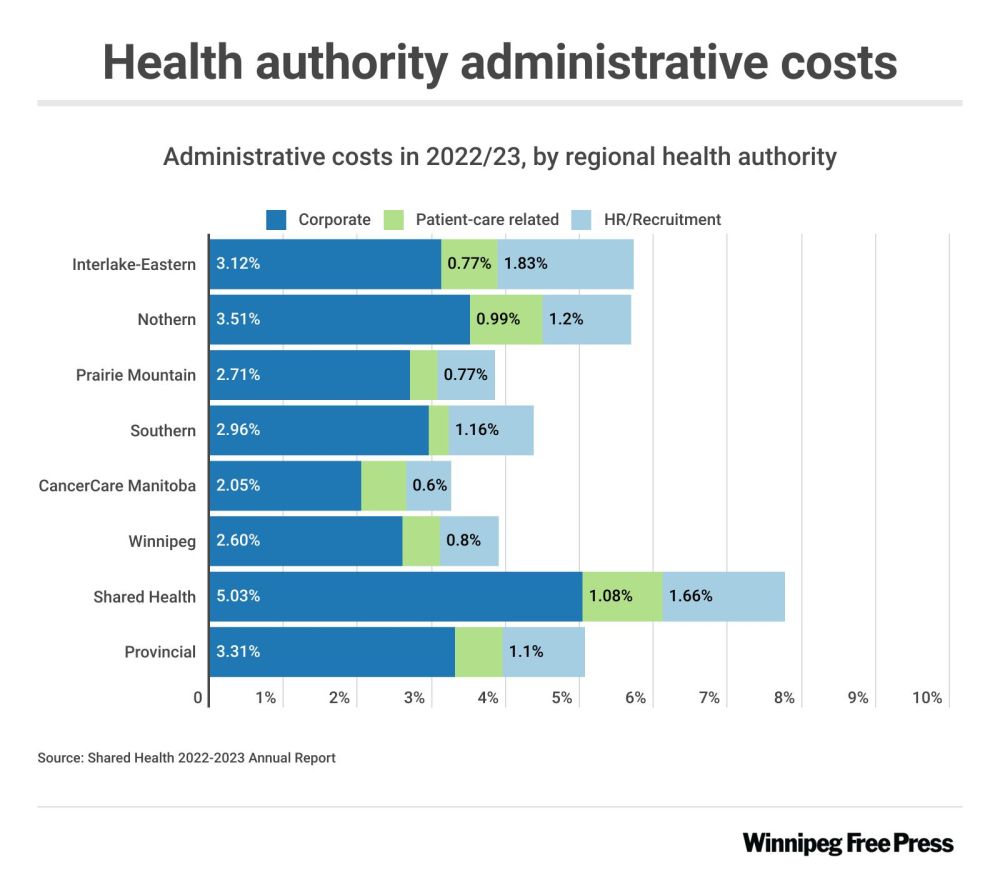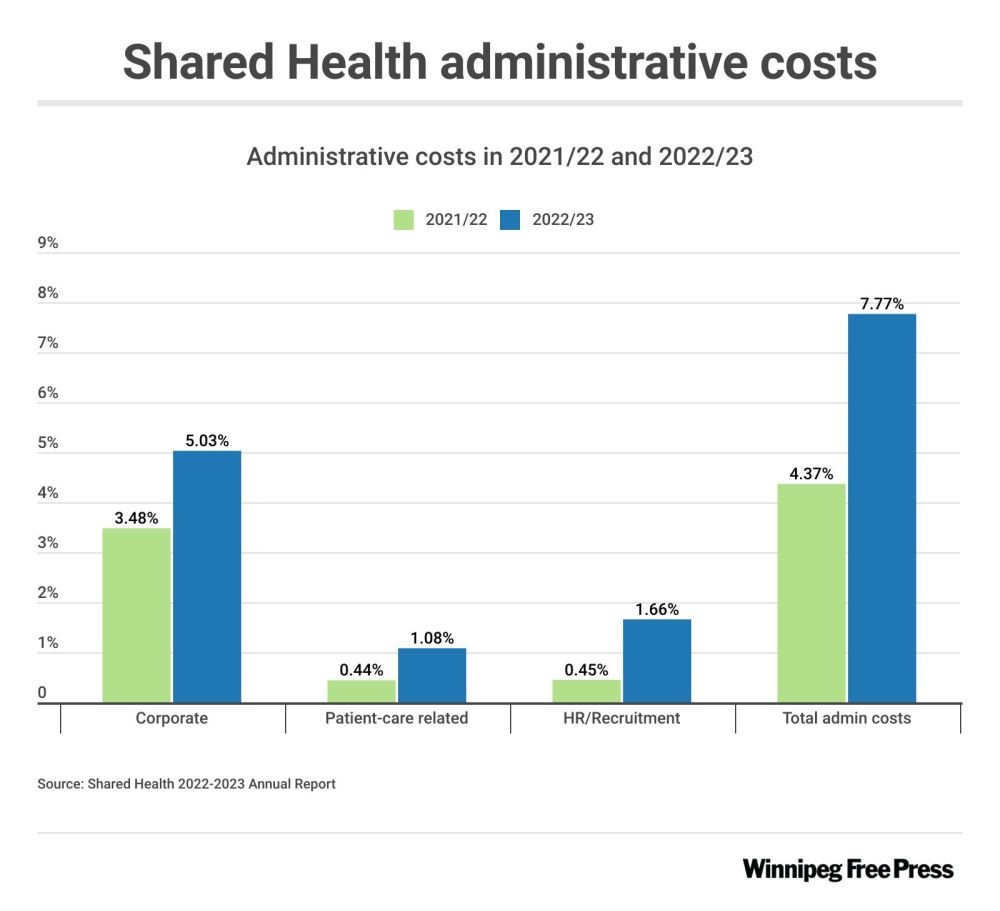Health system struggles to breathe under growing weight of resource-gobbling bureaucracy
Advertisement
Read this article for free:
or
Already have an account? Log in here »
To continue reading, please subscribe:
Monthly Digital Subscription
$0 for the first 4 weeks*
- Enjoy unlimited reading on winnipegfreepress.com
- Read the E-Edition, our digital replica newspaper
- Access News Break, our award-winning app
- Play interactive puzzles
*No charge for 4 weeks then price increases to the regular rate of $19.00 plus GST every four weeks. Offer available to new and qualified returning subscribers only. Cancel any time.
Monthly Digital Subscription
$4.75/week*
- Enjoy unlimited reading on winnipegfreepress.com
- Read the E-Edition, our digital replica newspaper
- Access News Break, our award-winning app
- Play interactive puzzles
*Billed as $19 plus GST every four weeks. Cancel any time.
To continue reading, please subscribe:
Add Free Press access to your Brandon Sun subscription for only an additional
$1 for the first 4 weeks*
*Your next subscription payment will increase by $1.00 and you will be charged $16.99 plus GST for four weeks. After four weeks, your payment will increase to $23.99 plus GST every four weeks.
Read unlimited articles for free today:
or
Already have an account? Log in here »
Hey there, time traveller!
This article was published 09/11/2023 (762 days ago), so information in it may no longer be current.
Shared Health’s bureaucratic costs are soaring. The provincial health authority spent $118 million on administration last year, according to the organization’s recently released 2022-23 annual report. That’s up from $76 million the previous year.
Administrative costs made up 7.77 per cent of Shared Health’s total spending last year, a significant jump from 4.37 per cent the previous year.
So, what are Manitobans getting in return for this bulging bureaucracy? Not much, considering hospital wait times continued to rise last year and emergency rooms are still busting at the seams.
Shared Health was created by the former Progressive Conservative government in 2018. It’s an added layer of bureaucracy that oversees the delivery of health-care services provincewide, but also runs some facilities and programs. Shared Health operates Health Sciences Centre, Manitoba’s largest hospital. It also manages diagnostic services provincewide, operates mental-health and addictions programs, runs emergency-response services and several other programs. It operates like any other health authority in Manitoba, but also acts as the central planner and co-ordinator for the province.
Shared Health has grown significantly over the past five years. It has established new levels of bureaucracy that never existed before. That includes the creation of the “transformation management office,” which is “aimed at improving the quality, accessibility and efficiency of health-care services across Manitoba.”
Trouble is, there haven’t been a lot of improvements to boast about in Manitoba’s beleaguered health-care system. Wait times for surgical procedures have grown, hospital overcrowding is worse than it was in 2018, ER wait times are way up and the percentage of patients leaving hospital without being seen by a doctor (because of long wait times) has skyrocketed. At HSC, that figure has nearly tripled from 10.8 per cent in 2018-19 to 27 per cent last year.
It’s not because more people are showing up at HSC’s ER. On the contrary, the number of emergency department visits fell to 53,357 last year from 54,093 the previous year. The bottlenecks and the unsafe conditions at HSC are caused by a chronic shortage of front-line staff.
Bureaucratic costs are way up but the number of staffed hospital beds at HSC fell to 649 last year from 653 in 2020-21, according to the annual report.
“Bureaucratic costs are way up but the number of staffed hospital beds at HSC fell to 649 last year from 653 in 2020-21, according to the annual report.”
Corporate administrative costs at Shared Health jumped from $60.2 million in 2021-22 to $76.6 million last year. Administrative costs related to patient care more than doubled to $16.4 million from $7.5 million. And office costs related to recruitment and retention more than tripled to $25.4 million (with questionable results).
Shared Health says its bureaucratic spending has increased mostly because it has taken on administrative functions from other health agencies, allowing regional health authorities to focus more on health-care delivery.
Perhaps. But the administrative costs of most other regional health authorities have also grown.
Total administrative costs for all health authorities, including Shared Health, increased to $300.2 million last year from $260.6 million the year before, a 15 per cent increase. It represents 5.06 per cent of all health authority spending, up from 4.28 per cent the previous year.
Some who work in the health-care field, including physicians and nurses, have said the additional layers of bureaucracy have made their jobs more complicated, not easier. Instead of finding efficiencies, breaking down “silos” and centralizing administrative functions so front-line staff can do their jobs better, there are more levels of bureaucracy to navigate than ever before.
Each hospital or health-care facility has its own administration, which operates under a regional health authority which, in turn, answers to Shared Health. The previous Tory government also added the Diagnostic and Surgical Recovery Task Force to the mix in 2021. It’s a bureaucratic nightmare.
It’s little wonder administrative costs are going through the roof.
Manitoba’s new NDP government has promised to reduce the size of the health-care bureaucracy. Premier Wab Kinew pledged during the recent provincial election campaign that under an NDP government more resources would go to the front lines and less to corporate offices. He promised more doctors, nurses and allied health workers and fewer pencil-pushers and public relations staff. Manitobans should hold him to that.
tom.brodbeck@freepress.mb.ca

Tom Brodbeck is an award-winning author and columnist with over 30 years experience in print media. He joined the Free Press in 2019. Born and raised in Montreal, Tom graduated from the University of Manitoba in 1993 with a Bachelor of Arts degree in economics and commerce. Read more about Tom.
Tom provides commentary and analysis on political and related issues at the municipal, provincial and federal level. His columns are built on research and coverage of local events. The Free Press’s editing team reviews Tom’s columns before they are posted online or published in print – part of the Free Press’s tradition, since 1872, of producing reliable independent journalism. Read more about Free Press’s history and mandate, and learn how our newsroom operates.
Our newsroom depends on a growing audience of readers to power our journalism. If you are not a paid reader, please consider becoming a subscriber.
Our newsroom depends on its audience of readers to power our journalism. Thank you for your support.
History
Updated on Thursday, November 9, 2023 3:00 PM CST: images added
Updated on Thursday, November 9, 2023 3:02 PM CST: Formatting




